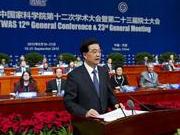Hu attends 23rd TWAS General Meeting in Tianjin

 0 Comment(s)
0 Comment(s) Print
Print E-mail CNTV, September 19, 2012
E-mail CNTV, September 19, 2012
The 23rd General Meeting of the Academy of Sciences for the Developing World, or TWAS, was held in Tianjin on Tuesday. More than 400 leading members of the global scientific community attended the three-day event.
A grand academic gathering is being held to review the status and future prospects of science and technology in developing countries.
![Chinese President Hu Jintao (R, front) shakes hands with an attendee before the opening ceremony of the 12th General Conference and 23rd General Meeting of the Academy of Science for the Developing World (TWAS) in Tianjin, north China, Sept. 18, 2012. [Xinhua] Chinese President Hu Jintao (R, front) shakes hands with an attendee before the opening ceremony of the 12th General Conference and 23rd General Meeting of the Academy of Science for the Developing World (TWAS) in Tianjin, north China, Sept. 18, 2012. [Xinhua]](http://images.china.cn/attachement/jpg/site1007/20120919/00016c42b25a11c3650525.jpg) |
|
Chinese President Hu Jintao (R, front) shakes hands with an attendee before the opening ceremony of the 12th General Conference and 23rd General Meeting of the Academy of Science for the Developing World (TWAS) in Tianjin, north China, Sept. 18, 2012.?[Xinhua] |
It began with a keynote speech by President Hu Jintao. During the speech, he promised the Chinese government would grant 1.5 million USD to TWAS for further boosting scientific research in developing countries.
He also presented the TWAS Prizes and Medals to the honored recipients afterwards.
Lin Yibing, professor and TWAS 2011 Prize Winner, said, "I think TWAS has helped a lot to boost scientific development in developing countries. President Hu Jintao just promised to grant 1.5 million USD to TWAS, which will make a significant contribution in helping the developing world communicate and share scientific research."
Patricio Felmer, mathematician and TWAS 2011 Prize Winner, said, "One of the important things is to help develop the capacities in countries with less development and create relationships with the countries, for example, to make scientists or students to go from one country to another. That will be very good to promote many developing countries to offer courses and research capabilities to other countries. And that's good for both developing."
Dr. Bai Chunli, president of the Chinese Academy of Sciences, was elected the new president of TWAS. He is the first Chinese academician that has been awarded this position.
Forums and symposiums regarding science, technology and innovation are expected to be held over the following two days.
In recent years, the TWAS General Meeting has become signature events for the state of science in the developing world. This year's meeting is believed to once again highlight the superb scientific research taking place in developing countries and demonstrate the positive impact on people's lives.





